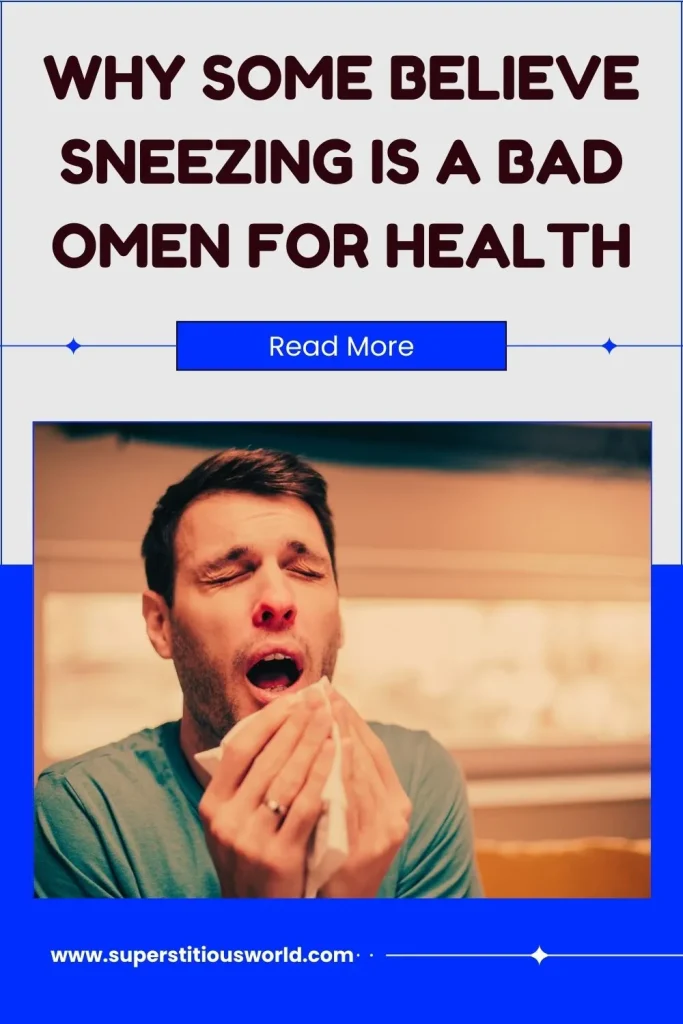From the bleakest of winter days, where the wind seems to cut through even the thickest of clothes, to the pollen-filled breeze of an early spring morning, sneezing is a natural act we all take part in.
Still, despite such a common, almost mundane action, throughout history, sneezing has not been spared from a tangle of myths, superstitions, and even fears. Some cultures regard it as an omen toward bad health or negativity in one way or another. But why is sneezing considered in such low regard?
In this blog, we will be discussing the physiological mechanism of sneezing, the historical background, and the many beliefs that have led people to perceive this reflex in various ways. We will also cover the psychological and social repercussions of sneezing, clear up medical misconceptions, and outline why such age-old misconceptions need to be overturned.

READ NEXT: The Surprising Health Superstitions People Still Believe In
Key Takeaways
- Cultural reactions to sneezing, from “Bless you” to “Gesundheit”, have their roots in ancient contagious or perilous conceptions but today are used out of politeness and continue the belief that sneezing is odd or shocking.
- Medical perspectives on sneezing emphasize the fact that it is a natural reflex-not a symptom of oncoming illness. It can be a symptom of allergies or other minor health problems and often leads to useful diagnoses.
- Such superstitions related to sneezing can be overcome by properly educating them about the physiological reasons behind sneezing. Knowledge of the science would provide them with the understanding that it is a healthy defense mechanism rather than something to be feared.
- Some basic realistic ways one can approach sneezing include avoiding allergens, using a humidifier, and cleaning on a regular basis. Medical treatment might also be necessary with regard to persistent problems.
Physiological Mechanism of Sneezing
What Happens When You Sneeze?
Steranutation or sneezing is a very forceful and reflexive expulsion of air from the lungs through the nose and mouth. It becomes initiated through irritation of the lining of your nasal cavity called the nasal mucosa. This may be because of many types of stimuli: allergens like pollen, pieces of dust, environmental irritants, or even viruses involved in the pathogenesis of the common cold. [1][3]
These same irritants, when exciting the mucous membranes lining your nose, send an impulse along the fifth cranial nerve to the “sneezing center” in your brainstem. Your body then undertakes a complex reflex in response. In short, briefly, your throat and mouth shut, your chest muscles contract, and a blast of compressed air is forced out, sometimes at speeds of more than 40 miles an hour. This sudden burst of air being propelled out of the body serves to dislodge the irritant in the nasal pathway and give instant relief along with protection to the respiratory system.
Sneezing for Defense
At its core, sneezing is a protective mechanism. It is a way for the respiratory system to keep itself clean from foreign elements, pathogens, and allergens before they may cause more damage. Thus, sneezing is the body’s automatic protection against invasion.
Though the act of sneezing is not injurious to health, it tends to point toward other specific health disorders such as allergies, respiratory infections, or sinusitis. Generally, it is a way your body acts in defense and tries to keep your nostrils clean and free of irritants. [3]
Cultural Perception of Sneezing
Superstitions Among the Cultures
While sneezing in itself is a biological reaction, many cultures have conventionally related it with mystic or superstitious beliefs. Many cultures perceived sneezing as either an omen or a sign of bad luck. A good example is the Eastern European traditions, where if one sneezes while putting on clothes, it is believed that he will experience an unpleasant event in his activities later during the day.
For other cultures, sneezing has something to do with inter-personal relationships. For instance, there are those who believe that sneezing is an indication that someone is thinking about a person. This is because such superstition depends on the number of sneezes a person experiences. A single sneeze might mean positive thoughts of someone; however, two successive sneezes may imply the opposite.
To add to this belief, Japanese culture believes that if one sneezes once, someone is praising them; sneezing twice means someone is criticizing them, while sneezing three times means that someone is speaking ill of them. These show the wide beliefs that sneezing can range from positive to negative. [2]
History of Superstitions about Sneezing
Most of the superstitions about sneezing have very deep historical roots. For instance, during the Middle Ages, there are those who used to feel that sneezing was a signal to sickness and therefore viewed them as epidemics, such as the bubonic plague. Due to the fact that sneezing often came as an accompaniment to the early stages of fatal diseases, people considered that it was one of the deathly signals or signs of falling sick.
It was during this period that the phrase “God bless you” came to be used as protection. Sneezing, so the belief of the time, opened up the body to evil spirits, and therefore “God bless you” had in mind protecting the person against such evil spirits. The practice of blessing sneezes with time became common and goes on till today in many cultures despite the fact that most people no longer associate sneezing with spiritual harm.
The superstition about sneezing descended from historic background, explaining why many cultures view sneezing as a bad omen. Such beliefs were passed down through generations and have given sneezing the lasting tag of ill health or misfortune. [4][5]
Psychological Dynamics of Sneezing
Fear and Anxiety Associated with Sneezing
With many of the beliefs linked to sneezing when they are a form of a bad omen or an indication of sickness, it is not hard to imagine the anxiety this creates in overly superstitious persons. Such an ideology on sneezing makes people very sensitive to their sneezes and those of others around them.
This may worsen during cold and flu seasons, when some individuals will feel nervous about sneezing in public because they do not want to appear contagious or sickly. The social stigma of sneezing, especially in the modern age, is just awkward and/or makes someone feel anxious. This is especially the case in places where public health concerns—such as those lived during the COVID-19 pandemic—have raised awareness about sneezing and its association with illness.
Social Reactions to Sneezing
The standard social response to sneezing—to say “Bless you” or “Gesundheit“—can be understood as a harmless convention that, in fact, reifies cultural attitudes about sneezing. Both sayings originate in practices associated with the threat of contagion or even demonic invasion. Today, most say “Bless you” out of habit or politeness; still, the phrase can continue to evoke connotations of sneezing as something threatening or suspect.
In addition, the attention that is given to them by people when they sneeze in social settings fosters this feeling of being watched or judged. Direct responses when one has just sneezed may make a person or some people wary, considering the insecurities they may already have with regards to sneezing in public.
The Place of Contemporary Medicine
Medical Views of Sneezing
Medically speaking, it is neither a bad omen nor a sign of impending sickness in or of itself. While sneezing does point to the existence of certain states of health—common allergies, colds, and flu, as well as environmental irritants—there are no real associations with illness.
Meanwhile, it is considered by many in the field of healthcare as a very helpful symptom—one that may lead to the actual diagnosis of the root cause. Frequent sneezing is capable of portraying allergic rhinitis or sinus infections—conditions that are very well treatable. Doctors might prescribe allergy tests or nasal sprays that will alleviate symptoms and further ensure future sneezing incidents do not happen. This is where understanding what the doctor says about sneezing helps the patient rid themselves of apprehension and baseless dread. [3]
Erasing Misconceptions through Education
The way to erase the lingering superstitions is to educate the masses on why sneezing occurs physiologically. By providing a scientific view of sneezing, one will appreciate the body’s natural defense mechanism and not view sneezing as dangerous or ominous.
Education on respiration principles and environmental care are concerns for individuals who sneeze frequently because of allergies. The triggers of sneezing, like dust, pollen, and pet dander, must be avoided to lessen the occurrences of sneezing for improving the health status. Other symptomatic medications to reduce sneezing and its associated symptoms may include antihistamines and nasal corticosteroids.
Understanding sneezing—why it occurs and how to address the causes—will enable a person to better manage their health without treatments based on superstitious or outdated ideas.
Practical Ways of Decreasing Sneezing
Sneezing is natural; however, when it happens due to certain preventable reasons, such as allergic agents or environmental causes, there’s a way to decrease its happening. Following are some practical steps to decrease sneezing:
- Clean up where you live: House dust mites and other allergens, such as pollen, can linger inside the house. Regular cleaning, like dusting and vacuuming, can decrease these aggravating agents.
- Avoid known allergens: If one has allergies, avoiding exposure to whatever it is that causes sneezing is paramount. This may mean staying indoors on high-pollen days or using air purifiers to remove dust and particles from the air.
- Use a humidifier: Dry air irritates the nasal pathways and might cause sneezing. A humidifier adds moisture to the air that can be used to avoid having your nasal pathways too dry and irritated.
- Medical attention should be sought: If the sneezing persists and is bothersome, then it might be due to allergies or other causes. The doctor might recommend some treatment, such as antihistamines or nasal sprays, necessary for maintaining your symptoms under control.
Final Thoughts
Though sneezing is often accompanied by long-standing beliefs and superstitions, we now have a deeper understanding of its scientific basis. Sneezing is a protective reflex that guards the respiratory system from harmful particles and irritants. It is not a sign of impending doom—neither should it be feared or stigmatized.
Through an understanding that sneezing is mainly a protective mechanism, we can diffuse some of the fear and trepidation associated with these acts, other than being a bad omen. Understanding the conceptual history behind such superstitions is crucial to appreciate whence these beliefs came from, but modern science dictates we consider sneezing for what it truly is: an everyday, protective bodily function.
Living in a world where health concerns usually come into the fore, articulate and factually correct understanding of sneezing could help people adjust perception. What we can do is learn how to reframe our view: to see sneezing as part of life that is necessary, healthy, reassuring, and protective to our bodies from environmental threats.
READ NEXT: The Healing Power of Crystals: Belief or Superstition?
READ NEXT: How Talisman and Amulets Are Thought to Protect Against Illness
References
[1] https://newsnetwork.mayoclinic.org/discussion/something-to-think-about-bless-the-sneeze/
[2] https://www.ceenta.com/news-blog/6-myths-superstitions-and-more-about-sneezing
[3] https://www.healthline.com/health/sneezing
[4] https://www.ncbi.nlm.nih.gov/pmc/articles/PMC2429626/pdf/postmedj00163-0054.pdf
[5] https://en.wikipedia.org/wiki/Response_to_sneezing
[6] https://www.healthline.com/health/holding-in-a-sneeze
[7] https://www.loc.gov/everyday-mysteries/biology-and-human-anatomy/item/does-your-heart-stop-when-you-sneeze/
[8] https://www.bbc.com/news/health-42701590



